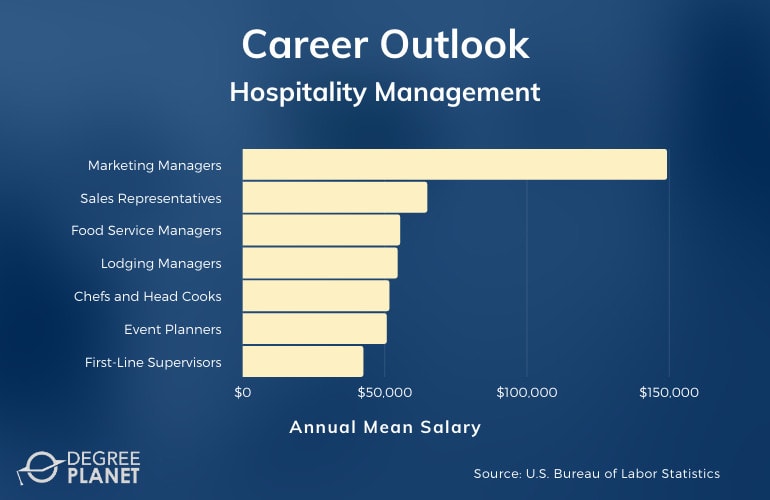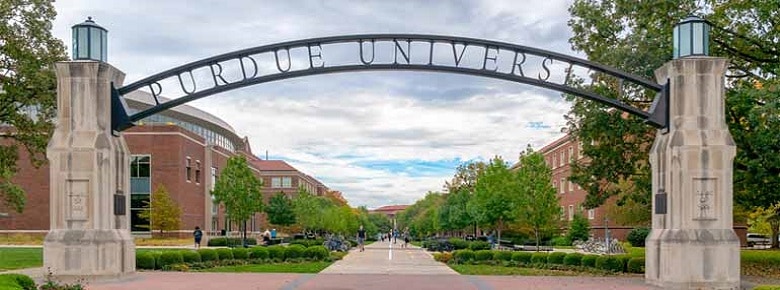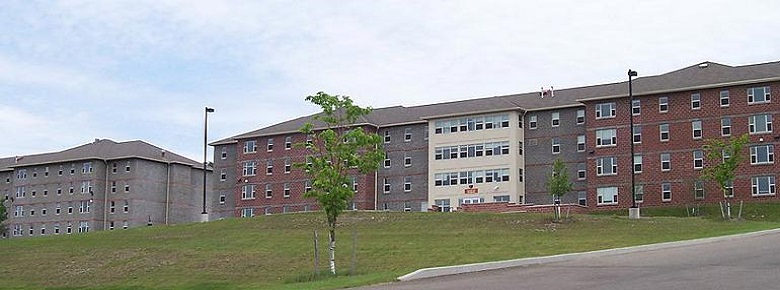If you’re thinking about a career in the service industry, you may want to consider an online associates degree in hospitality management.

Editorial Listing ShortCode:
It’s an important qualification for many entry-level jobs, and it may also be used as a stepping stone for a bachelor’s or master’s degree in the future. Additionally, since it’s earned online, you may study at your own pace from the comfort of your own home.
Online Associates Degrees in Hospitality Management

A degree in hospitality management can help prepare you for work in hotels, restaurants, resorts and other places of customer service. It’s frequently but not always combined with studies of tourism and commerce.
You’ll need certain skills to succeed in this field. Here’s a small sample of what employers might look for in job candidates:
- Intelligent
- Detail-oriented
- Good communication
- Problem solver
- High level of interpersonal skills
Since it’s a management degree, employers might also look for leadership qualities. You might be expected to prove that you can work independently or take charge of teams or shift responsibilities.

The value of a hospitality management degree can vary. In some cases, it can help qualify you for real positions of authority in a hotel or restaurant. In other cases, it can help you get your foot in the door as an entry-level professional, and you’ll need to work your way up the ladder for a more lucrative position.
There are several ways to earn an associate degree in hospitality management, including an Associate of Arts (AA), an Associate of Science (AS) and an Associate of Applied Science (AAS).
You may also earn a related degree like an Associate of Business Administration (ABA) with an emphasis in hospitality management. Ultimately, you’ll have to decide for yourself which hospitality degree is best suited for your particular career goals.
Hospitality Management Careers & Salaries

What can you do with a degree in hospitality management? It depends on what you’re interested in, what you choose to specialize in and where you’d like to work after graduation. Depending on your credentials, your career options could be quite varied.
If you’re good at customer service, for example, you might like a front-facing job where you interact with the public, or you might enjoy working as an agent or liaison between companies, customers and vendors. You might also start your own business as an event planner or travel consultant if you’re the independent type.
If you prefer to manage things behind the scenes, you might also find a job as an administrator, bookkeeper, finance manager or marketing director.
Editorial Listing ShortCode:
Another possibility is specializing in a particular area of focus. If you love to cook, for example, you might combine a hospitality management degree with your passion for the culinary arts. If you want to work for a hotel chain, you might become a manager in everything from bookkeeping to housekeeping.
According to the Bureau of Labor Statistics, you may be able to make $42,000 or more with a degree in hospitality management.
For a more individualized look at wages, here are some careers that may be of interest to you:
| Careers | Annual Mean Salary |
| Marketing Managers | $142,170 |
| Hotel Supplies Sales Representatives | $62,070 |
| Food Service Managers | $56,590 |
| Lodging Managers | $56,670 |
| Chefs and Head Cooks | $53,380 |
| Meeting, Convention, and Event Planners | $51,560 |
| Travel Agents | $42,350 |
| Housekeeping Supervisors | $42,040 |
Depending on the employer, you may need additional education or work experience to qualify for some of these jobs. Just remember that these are averages and not specific salaries. Your exact wages will depend on things like age, experience, demand, job title, degree level, industry growth, and geographic location.
Hospitality Management Specializations & Concentrations

Some degree programs allow you to concentrate your studies on a particular area of interest. These concentrations are optional, but they may look good on a resume, and they can help prepare you to take on specialized roles within the industry once you enter the workforce.
With hospitality management, you can specialize in the following:
- Brand Management and Guest Services: With an emphasis on sales and marketing, this concentration is for future business professionals who are good at public relations.
- Event & Meeting Planning: Event planning requires many moving parts to come together, and these classes can help you learn the basics of budgeting, scheduling, supplying and organizing.
- Hotel and Lodging Management: “Lodging” is often used as a catch-all term in the hospitality business for any kind of accommodation. Their operations are at the forefront of these degree programs.
- Restaurant Management: Restaurant management can draw on many different disciplines, including food, finance, retail, business administration and more. Their programs are as varied as the restaurants that you see outside.
- Travel & Tourism Management: Another wide-ranging field, tourism is often divided into sub-specialties that include areas of interest such as global business, travel operations and customer service management.
Different schools have different specialties, so don’t be afraid to shop around. One of the benefits of online degree programs is that you aren’t limited to whatever is offered by nearby colleges. If you need to enroll in a long-distance university to get that associate’s degree in hospitality travel and tourism, that may be an option for you.
Choosing an Online Associates in Hospitality Management Degree

With so many options for a hospitality management degree, how are you supposed to know which one is right for you?
Editorial Listing ShortCode:
Here are just a few things that you may put on your checklist:
- Accreditation. This is essential for things like transferring credits and receiving financial aid. It can also influence the worth of your degree in the eyes of future employers.
- Degrees, concentrations, certificates and licenses. What are you looking for in a hospitality program? What classes do you need? What specializations are you considering?
- Online accessibility. If you’re keen to take classes online, make sure that the school has a robust “e-campus” with plenty of resources for distance learners.
- Admissions. Some schools are more selective than others. Some might also offer things like rolling admissions to make it easier for busy adults to get back in school.
- Transfer programs. If you think that you might be interested in getting a bachelor’s or master’s degree some day, look for a school with transfer programs to affiliated four-year universities.
Everyone has their own ideas about what constitutes a “good” college degree. At the end of the day, however, you’re the only person who will know what feels right to you.
Hospitality Management Curriculum & Courses

While every university is different, hospitality degrees usually teach the same general range of skills. Classes might include any or all of the following:
- Interpersonal Communication: Communication is a vital skill in the hospitality industry, so classes can range from public speaking courses to conflict resolution seminars.
- Principles of Microeconomics/Macroeconomics: Depending on your field of interest, you might need these basic, entry-level courses in economics.
- Human Resource Management: HR classes cover employment-related topics such as benefits, compensation, staffing, recruiting and workplace safety.
- Leadership: As a future manager, you might be interested in leadership courses that cover topics like organizational behavior and strategic decision making.
- Hotel/Lodging Management and Operations: These classes can help you learn the ins and outs of day-to-day operations at lodging facilities.
- Finance: Finance classes come in many forms and can help you learn many skills, including budgeting, bookkeeping, auditing, invoicing and more.
- Hospitality Sales and Promotion: Usually offered in conjunction with marketing courses, these subjects can help prepare you for the promotional challenges of the hospitality industry.
- Law and Liability: There can be a lot of liability involved with travel and tourism, and these classes can help you learn how to recognize, address and resolve it.
- Fundamentals of Food Preparation: An essential class for many parts of the hospitality industry, “Food Prep 101” is an introduction to the general framework of the eating business.
- Internship: Some hospitality degree programs will offer you the chance to get real-world experience through an internship. It’s usually offered during your final year of school.
If you choose to specialize, you might also need to take core classes or electives in subjects related to your area of study.
Admissions Requirements

Many associate degree programs are offered by community and technical colleges. They tend to be less selective than other schools, but don’t make the mistake of thinking that they’re free-for-alls. You’ll still need to meet certain admission criteria to get in:
- High school diploma or GED. Most colleges will require a high school diploma or its equivalent as a basic part of the admissions process.
- Test scores. Some schools will ask for SAT/ACT scores. Others might waive this requirement if you’re an older student or if you already have professional experience in the field.
- Placement tests. It’s very common for colleges to require placement tests in basic subjects such as math, science and English. It helps them determine if you’re ready for college-level coursework.
If you’re missing something from this list, get in touch with your local community college. They might have pre-enrollment programs for students who need to take prep or remedial classes before they can join their peers in actual degree programs.
Accreditation

Accreditation is a way for colleges to prove that they meet the standards set forth by the U.S. Department of Education. It’s a voluntary process, but it’s a requirement for things like federal financial aid, and it can impact how your credits are transferred if you ever need to change schools.
It’s also regarded as a sign of legitimacy. If you attend an unaccredited school, some employers might not recognize your degree.
Editorial Listing ShortCode:
There are three main types of accreditation:
- Regional accreditation
- National accreditation
- Programmatic accreditation
The first two types are also known as “institutional accreditation” since they’re awarded to entire colleges or institutions. The third type is awarded to specific degree programs within schools.
Hospitality Management Program Accreditation

When it comes to programmatic accreditation for hospitality management degrees, there are a few names that you’ll likely see:
- Accreditation Commission for Programs in Hospitality Administration: The ACPHA is the biggest organization of its kind, and it offers a searchable database on its website for accredited schools and programs.
- American Culinary Federation Education Foundation Accrediting Commission: Devoted to the culinary arts, the ACFEFAC isn’t meant specifically for hospitality programs, but there’s a lot of overlap between them.
There are other accrediting boards for hospitality degrees as well. It’s a big industry. You might want to look around and see what else is out there before you make any educational decisions.
Hospitality Management Professional Organizations

There are many organizations for students and professionals in the hospitality industry, including:
- American Hotel and Lodging Association: With thousands of members, the AHLA has one of the biggest networks for hotel professionals of all types.
- Corporate Event Marketing Association: CEMA revolves around corporate events and offers many education- and career-related resources for its members.
- Event Planners Association: Open to anyone in the event or amusement industry, the EPA offers everything from time-saving contracts to vendor directories filled with product discounts.
- Hospitality Sales and Marketing Association International: Members of HSMAI have exclusive access to conferences and certification programs within the fields of sales, retail and marketing.
- National Association for Catering and Events: With videos, galleries, events, certifications and member directories, the NACE is a one-stop shop for future caterers.
- National Restaurant Association: With more than 500,000 members, the RHA is the largest and most well-known organization of its kind, making it perfect for future restaurant professionals.
- National Tour Association: The NTA serves travel professionals who work with people flying in and out of North America.
As you can see, professional organizations can range from big, well-known networks to small groups serving niche markets. It’ll be up to you to decide which is best for your particular needs as a hospitality student.
Hospitality Management Licensing and Certification

In today’s competitive job market, it isn’t always enough to have a degree. You might need the extra edge offered by a certification.
Editorial Listing ShortCode:
Here are just a few options for hospitality management students:
- American Hotel & Lodging Educational Institute: Run by the American Hotel and Lodging Association, this is an educational organization that offers many certification programs for those in the hotel business.
- Certified Hospitality Supervisor: The CHS is for authority figures in the world of hospitality, including owners, managers and administrators.
- Certified Hotel Asset Manager: The CHAM is for those who work in hotel finance and operations.
- Certified Lodging Security Director: Aimed at security professionals, the CLSD has stringent requirements, but it will certify you as an expert in the field.
- Certified Hospitality Revenue Manager: The CHRM is for revenue managers who work in travel- and tourism- related industries.
- Certified Spa Supervisor: If you own or operate a spa business, a CSS can distinguish you from your peers by certifying you as a leader.
- Hospitality Asset Managers Association: HAMA is another hospitality organization that offers multiple certification programs. Your eligibility will depend on your educational background and years of experience in the field.
You might also want to reach out to community colleges and trade schools about your certification options. Some have special programs to prepare students for certification.
Financial Aid

The first step to receiving financial aid is filling out the Free Application for Federal Student Aid (FAFSA). Like its name suggests, it’s completely free to submit, and it will determine if you’re eligible for various types of assistance:
- Grants
- Loans
- Work-study programs
If these don’t cover enough of your tuition costs, you can also look into private forms of assistance such as bank loans. Your employer might even offer tuition reimbursement.
Hospitality Management Scholarships

Scholarships are another form of financial assistance for college students. While it’s true that some are restricted to upper-level bachelor’s and master’s students, there are plenty of scholarships that are open to associate degree seekers as well.
- American Express Scholarship: Meant specifically for hospitality management students, this scholarship offers up to $2,000 to select students who are working in the industry while also attending school.
- American Hotel & Lodging Educational Foundation Academic Scholarships: The AHLAF offers a number of scholarships to hospitality students. They range in value from $500 – $7,500.
- Illinois Restaurant Association Educational Foundation Scholarship: This scholarship is awarded to selected students who are pursuing hospitality-related degrees in things like restaurant management and the culinary arts.
- NEWH, Inc. Scholarships: The Network of Executive Women in Hospitality offers many scholarships to female students in the hospitality industry.
There are many other scholarships out there for hospitality majors, so make sure to explore all of your options.
For example, if you’re seeking a hotel and restaurant management associate’s degree online, you could look specifically into hotel- and restaurant-related scholarships. Even if they aren’t advertised towards associate-level students, you might still be eligible for them.
What Can You Do With an Associate’s Degree in Hospitality Management?

There are many ways to apply a hospitality degree to the real world. The most obvious career path is becoming a manager of some kind. There’s always a need for competent leadership in hotels, casinos, restaurants, country clubs and other travel- and tourism-related businesses.
You might also become something like an event planner, travel consultant or activity director. The skills that you learn in a hospitality program can be a great help in careers that deal with the public.
Editorial Listing ShortCode:
You might even find work outside of the hospitality industry thanks to the diverse range of subjects that you’ll learn. For example, since many hospitality programs will teach you about sales and profits, you might channel this knowledge into a retail career rather than a travel one.
Can I Get My Associate’s Degree Online?

There are many online degree programs in hospitality management. They teach subjects like economics, communication, customer service, business administration and human resources, and some even offer degree concentrations in things like brand management or marketing.
Additionally, most hospitality degree programs can be completed 100 percent online without any face-to-face requirements. This makes them a convenient option for busy students who don’t want to be tied down to traditional college campuses.
How Long Does It Take to Get an Associate’s in Hospitality Management Online?

It usually takes two years to get an associate degree in hospitality management. This is assuming that you’re going to school full time. The calculation looks like this:
- 15 credits per semester x 2 semesters per year x two years of schooling = 60 credits
It usually takes 60 credits to earn an associate degree, so if you drop below 15 credits per semester or take any semesters off, you’ll lengthen your time until graduation. On the flip side, you can accelerate your graduation by increasing your course load, enrolling in summer semesters or earning special credits through programs like CLEP.
What Do Hospitality Managers Do?

“Hospitality manager” is a broad term that can refer to everything from hoteliers to restaurant supervisors. They usually watch over the day-to-day operations of their business, and depending on their industry, this might involve any or all of the following:
- Approving expenditures
- Making or managing appointments
- Resolving customer conflicts
- Overseeing security
- Directing management teams or promotional efforts
- Authorizing plans and programs
They might also have specialties involving food, laundry, sanitation, groundskeeping or other important areas of interest for a hospitality business.
How Much Money Can I Make With a Degree in Hospitality Management?

According to the Bureau of Labor Statistics, the salary ranges vary widely, with travel agents making on average $42,350 at the low end and marketing managers making on average $142,170 at the high end.
It all depends on where you work, what you do and which type of degree that you have.
Are There Affordable Online Degrees in Hospitality Management?

There are many affordable degrees for hospitality management, especially when you’re studying online.
It’s common for online hospitality management degree programs to have lower costs than their campus-based counterparts since they don’t require students to pay for things like housing, dining and parking. You can also avoid many campus-based activity and technology fees when you’re enrolled online.
Editorial Listing ShortCode:
Some schools will even go the extra mile and charge the same tuition for in-state and out-of-state distance learners. This isn’t a guarantee, of course, but it’s something to look into if costs are a primary decision factor for you. Make sure to double-check that your financial aid is applicable to online degree programs.
Universities Offering Online Associates Degree in Hospitality Management
Methodology: The following school list is in alphabetical order. To be included, a college or university must be regionally accredited and offer degree programs online or in a hybrid format.

- AAS in Hotel, Restaurant and Tourism Management
Albany Technical College is accredited by the Southern Association of Colleges and Schools Commission on Colleges.

- AA in Hospitality
APUS is accredited by the Higher Learning Commission.

- AAS in Hospitality Management
Bryant and Stratton College is accredited by the Middle States Commission on Higher Education.

- AAS in Hospitality and Tourism
Casper College is accredited by the Higher Learning Commission.

- AAS in Hospitality Management – Food and Beverage Management
- AAS in Hospitality Management – Hotel Management
Central Texas College is accredited by the Southern Association of Colleges and Schools Commission on Colleges.

- AAS in Hospitality and Tourism Management
Chemeketa Community College is accredited by the Northwest Commission on Colleges and Universities.

- AAB in Hospitality Management
Cincinnati State Technical and Community College is accredited by the Higher Learning Commission.

- AA in Hotel and Restaurant Management
Cowley College is accredited by the Higher Learning Commission.

- AAS in Hospitality Management
Delgado Community College is accredited by the Commission on Colleges of the Southern Association of Colleges and Schools.

- Associate’s in Hospitality Management
Fayetteville Technical Community College is accredited by the Southern Association of Colleges and Schools Commission on College.

- AAS in Tourism, Hospitality and Event Management
Genesee Community College accredited by the Middle States Commission on Higher Education

- AAS in Ecotourism and Adventure Travel
Herkimer College is accredited by the Middle States Commission on Higher Education.

- ABA in Hospitality Management
Macomb Community College is accredited by the Higher Learning Commission.

- Associate’s in Hospitality Management
Madison College is accredited by the Higher Learning Commission.

- AS in General Business – Hospitality Management
MassBay Community College is accredited by the New England Commission of Higher Education.

- AAS in Hospitality Management
Monroe College is accredited by the Middle States Commission on Higher Education.

- AS in Hospitality and Tourism Management
NHTI is accredited by the New England Commission of Higher Education.

- AAS in Hospitality and Casino Management
North Central Michigan College is accredited by the North Central Association of Colleges and Schools.

- AAS in Hospitality and Tourism
Peninsula College is accredited by the Northwest Commission on Colleges and Universities.

- AAS in Business Administration – Hospitality Management
Purdue University is accredited by the Higher Learning Commission of the North Central Association of Colleges and Schools.

- AS in Hospitality and Event Management
Sullivan University is accredited by the Southern Association of Colleges and Schools Commission on Colleges.

- AAS in Hotel and Restaurant
Tompkins Cortland Community College is accredited by the Middle States Commission on Higher Education.

- Associate’s of Travel and Hotel Management
UNOH is accredited by the Higher Learning Commission.

- AAS in Hospitality Management (Hybrid)
Wake Technical Community College is accredited by the Southern Association of Colleges and Schools Commission on Colleges.

- AAS in Hospitality Management
Western Technical College is accredited by the Higher Learning Commission.
Getting Your Associates in Hospitality Management Online

If you’re ready to enter the exciting, fast-paced world of hospitality management, an associate degree may be just what you need to get started.
Not only does it offer a wide variety of working environments such as hotels, restaurants, resorts, cruise ships and amusement parks, but it also has competitive salaries and high occupational growth rates within the industry.
It may be a great time for you to get an associate degree in hospitality management. Just reach out to some colleges of interest to get the ball rolling with your admission.

